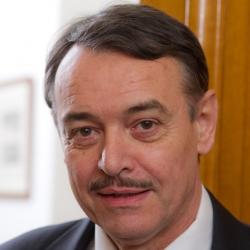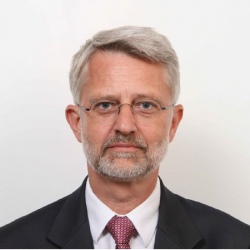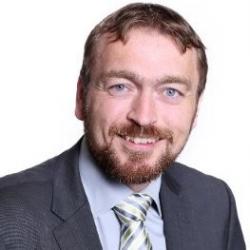Internal Audit: Moving at the Speed of Innovation
Internal Audit: Moving at the Speed of Innovation
Internal Audit: Moving at the Speed of Innovation
Internal Audit in a Changing Central Bank Landscape
13:30 – 15:00
What does a central bank board expect? A chairman’s view
Presentation followed by Q&A
13:30 - 15:00
- Assessing the complexities of the relationship between the board and the audit committee
- Key requirements for an effective board-audit relationship
- What do the reporting lines and communication channels look like?
- Discussion: Should internal audit be independent from executive management?
15:00 – 15:15
Coffee break
11:45 - 12:00
15:15 – 16:45
New challenges facing the internal audit function
Pre-recorded presentation
15:15 - 16:45
- Positioning audit in the governance structure of the organisation
- Understanding digital disruption and innovation and its effects on internal audit
- Overview of areas of accountability for internal audit
- What roles does internal audit play in helping management shape the culture of an institution?
Currently an international consultant in central banking and financial sector issues, Christian Durand was until 2018 deputy comptroller general of Banque de France, with direct reporting to the governor. His domain of responsibility included the audit function, operational risks and on-site inspections conducted by French examiners at the request of the Single Supervisory Mechanism (SSM) or the French banking supervision authority. Before that, he was deputy director general for economics and international affairs at the Banque de France, and in this context was a member of Banque de France Monetary and Financial Stability Policy Committees and regularly attended CGFS meetings at the BIS. During his career, Mr. Durand has held senior positions with the International Monetary Fund’s Monetary and Capital Markets Department, the French Banking Supervisory Authority and the French Securities and Futures Commission and led negotiations ending with the signing of MOUs with the US Securities and Exchange Commission (SEC) and Commodity Futures Trading Commission (CFTC). He has also worked extensively with financial institutions in France and other organizations, including the New York Federal Reserve Bank, the International Organization of Securities Commissions (IOSCO), FIRST initiative and the AFRITAC project. Through his different assignments he has developed a professional experience in central banking, international economics, financial supervision and financial sector development and stability issues. He has conducted or supervised the implementation of several technical assistance projects for the EU, the IMF or the Banque de France and led, for the IMF FSAP program, financial stability assessment missions in a wide range of countries starting with Cameroon in 1999 and ending with the United States in 2010. His academic education is in economics (thesis on “the concept of money in the controversies on capital, interest and fluctuations in the early thirties”), finance and law.
16:45 – 17:15
Coffee break
12:45 - 13:00
17:15 – 18:30
How can covid-19 help us to improve the brand internal function
17:15 - 18:30
- What is the process of allocating resources and how do you do this effectively to accomplish organisational objectives?
- Balancing the different management priorities on risk, control and governance
- The importance of agility in the audit function
- Examples of raising internal audit standards
Enhancing Organisational Resilience: Expanding the Toolkit
09:00 – 10:30
Internal audit – Integrating with strategy and performance
09:00 - 10:30
- What is your short, medium and long term strategy?
- How have you addressed the main management concerns?
- Is value being added with your strategy?
- Measuring the performance and effect of strategy integration with internal audit
10:30 – 11:00
Coffee break
11:45 - 12:00
11:00 – 12:30
Internal audit – Integrating with strategy and performance: a case study
11:00 - 12:30
- Kindly bring your organisation’s mission statement and its strategy/ strategic intents as well as a list of all internal audit activities over the past two years.
- Best practices for navigating the relationship between audit and risk – defining the responsibilities
12:30 – 13:30
Break
12:45 - 13:00
13:30 – 15:00
Corporate culture: creation and reinforcement through shared values and behaviours
Pre-recorded presentation
13:30 - 15:00
- Is corporate culture defined or implied? What makes culture visible?
- The role of internal audit in driving corporate culture
- Effective strategies for measuring corporate culture
- Raising awareness on widespread impact culture has on institutions and approaches to auditing corporate culture
15:00 – 15:30
Coffee break
15:00 - 15:30
15:30 – 17:00
Conduct risk: from a framework-based to integrated approach
15:30 - 17:00
- How is business being conducted in your central bank?
- What stakeholders are involved and what are their roles?
- The significance of managing ethical issues – code of business ethics
- How can conduct be successfully audited?
17:00 – 17:15
Coffee break
17:00 - 17:15
17:15 – 18:45
Challenges for central banks’ auditors
Presentation followed by Q&A
17:15 - 18:45
-
AUDIT IN THE GOVERNANCE UNIVERSE
- Governance
- Audit contribution
- Audit and evaluation
-
STRATEGIC CHALLENGES
- Risk based versus cost based
- Audit of Projects
- Consulting services
-
TECHNICAL CHALLENGES
- Financial stability
- Digital risks
- Corporate culture
Currently an international consultant in central banking and financial sector issues, Christian Durand was until 2018 deputy comptroller general of Banque de France, with direct reporting to the governor. His domain of responsibility included the audit function, operational risks and on-site inspections conducted by French examiners at the request of the Single Supervisory Mechanism (SSM) or the French banking supervision authority. Before that, he was deputy director general for economics and international affairs at the Banque de France, and in this context was a member of Banque de France Monetary and Financial Stability Policy Committees and regularly attended CGFS meetings at the BIS. During his career, Mr. Durand has held senior positions with the International Monetary Fund’s Monetary and Capital Markets Department, the French Banking Supervisory Authority and the French Securities and Futures Commission and led negotiations ending with the signing of MOUs with the US Securities and Exchange Commission (SEC) and Commodity Futures Trading Commission (CFTC). He has also worked extensively with financial institutions in France and other organizations, including the New York Federal Reserve Bank, the International Organization of Securities Commissions (IOSCO), FIRST initiative and the AFRITAC project. Through his different assignments he has developed a professional experience in central banking, international economics, financial supervision and financial sector development and stability issues. He has conducted or supervised the implementation of several technical assistance projects for the EU, the IMF or the Banque de France and led, for the IMF FSAP program, financial stability assessment missions in a wide range of countries starting with Cameroon in 1999 and ending with the United States in 2010. His academic education is in economics (thesis on “the concept of money in the controversies on capital, interest and fluctuations in the early thirties”), finance and law.
Internal Audit in the Age of “Digital Disruption”
09:00 – 10:30
Governance in the digital age
09:00 - 10:30
- How is digital transformation compromising the independence of internal audit?
- Should there be collaboration between the three lines of defence?
- Who is accountable for auditing digital disruptions?
- How is performance and progression measured?
10:30 – 10:45
Coffee break
10:45 - 12:00
10:45 – 12:15
Navigating internal audit through the digital evolution
Pre-recorded presentation
10:45 - 12:15
- Use of big data and data analytics
- Data governance: how far should internal audit go to protect information security?
- Approaches and methodologies for auditing new IT technologies
- What is the application, infrastructure and processes?
12:15 – 13:15
Break
12:00 - 12:45
13:15 – 14:45
Auditing cyber resilience: procedures and key indicators
Presentation followed by Q&A
13:15 - 14:45
- Case study: Example of a cyber attack
- Protocol for responding to a cyber attack
- How do you manage and mitigate cyber risk?
- What are the appropriate measures that can be put in place?
Demonstrating Value
09:00 – 10:30
Use the changed environment to newly brand IA
Presentation followed by Q&A
09:00 - 10:30
- How to use the current disruption to accelerate transformation?
- Understand key criteria for value addition
- Integrate with strategy and performance
- Partake in shaping the corporate culture
Klaus Gressenbauer
Former director, internal audit, European Central Bank and chairman of the internal auditors committee
European System of Central Banks
Klaus Gressenbauer joined the European Monetary Institute in December 1997 and the European Central Bank (ECB) at its inception in 1998. He held a number of management positions in international banking, primarily in the area of controlling and general management. Upon joining the ECB Mr Gressenbauer first served as Director Planning & Organisation and was later on appointed Director Internal Audit. In his ECB capacity and prior to becoming Director Internal Audit, he inter alia also served as Chairman of the European System of Central Banks' (ESCD) Benchmarking Working Group, Chairman of the ESCB Organisational Analysis Working Group, member of the ECB Budget Committee, member of the ECB Management Committee, member of the ECB Project Steering Committee, member of the ECB Assets and Liabilities Committee and is now Chairman of the ESCB's Internal Auditors Committee. Mr Gressenbauer studied communication theories and philosophy and holds a PhD in political sciences from the University of Vienna. He also holds a Master of Business Administration degree from the International Management Institute in Geneva.
10:30 – 11:00
Coffee break
10:45 - 12:00
11:00 – 12:30
Efficient operations in a three line of defence setup
11:00 - 12:30
12:30 – 13:00
Networking break
15:30 - 16:00
13:00 – 14:00
Closing remarks and delegate action plans
Concluding session led by the chair
13:00 - 13:30
- Summary of the course
- Discussion of the observed trends and case studies
- Application of learning points in the delegates’ home organisations
- Preparation of action points


